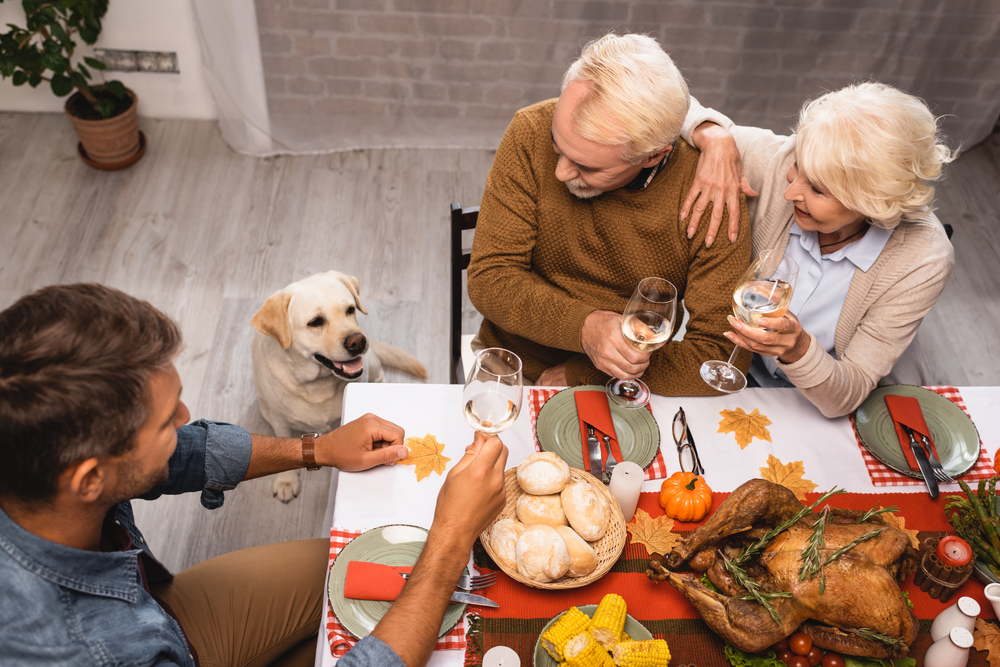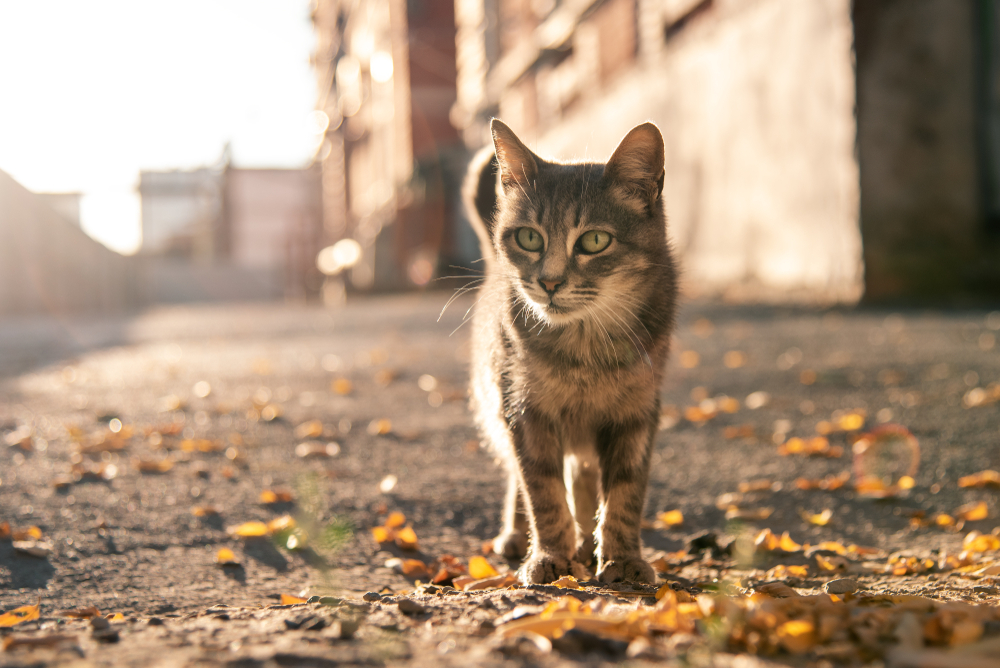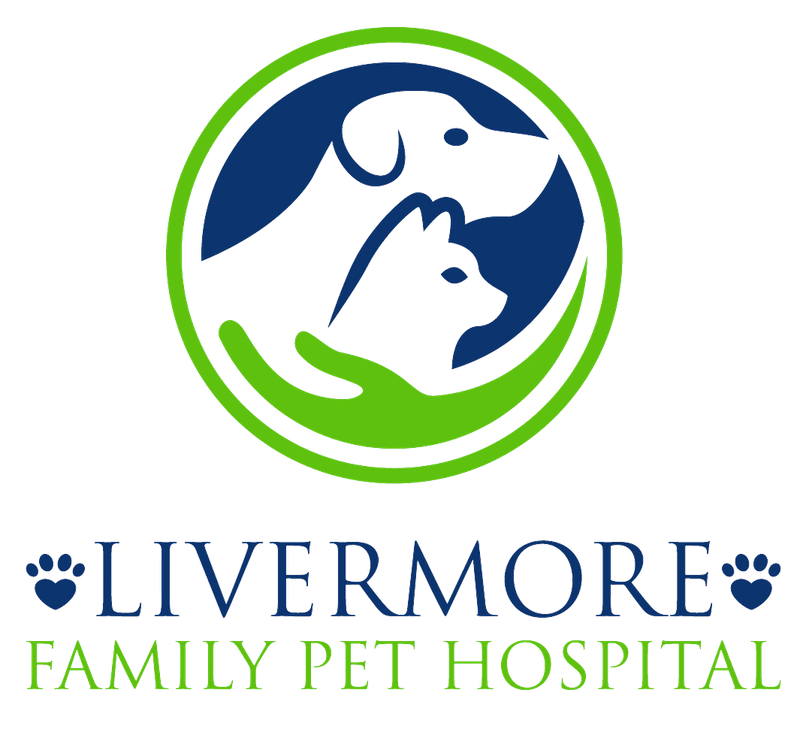
Thanksgiving is quickly approaching, and we know that many of our clients are already planning and preparing for the big day. As a kid, Thanksgiving seemed to magically happen—little did we realize that the wonderful holiday required so much time and hard work. Everyone has a long to-do list, but pet owners have the added responsibility of ensuring their pet’s turkey-day safety. While we cannot shorten your to-do list, we can help you avoid a Thanksgiving pet disaster—and maybe give you a few laughs along the way. Our Livermore Family Pet Hospital shares holiday tails—make that, tales—of some naughty pets and their Thanksgiving shenanigans that will make your pet look like an angel, while reminding you of potential pet hazards.
Tale #1: Painstaking preparation with a persistent pet
Sam the retriever woke up on Thanksgiving morning and knew something exciting was happening. Delicious, irresistible smells wafted from the kitchen, and he was quickly wide awake and leaping down the stairs—two at a time—to the kitchen, which was abuzz with activity. No one noticed Sam. He could tell his family was a bit anxious, because they rushed around back and forth between the oven and the sink, and by their short, somewhat curt, conversations—Sam even thought about trying to cheer up his owner with his own favorite squeaky toy. But, those thoughts were quickly lost when something sitting on the kitchen counter caught his eye. Pie. Fresh out of the oven, crusty-yet gooey, perfect apple pie. Sam looked back and forth between his distracted family and the pie, and he simply couldn’t resist. In a flash, Sam’s paws were on the counter, and his face was buried in dough that his owner was preparing to make bread.
Fortunately for Sam, his owner grabbed the dough before he could eat any, because the dough would have not only risen in his warm stomach and caused a serious obstruction, but also chave leached alcohol and Sam could have received alcohol poisoning.
- Moral of the story — Ensure your feast reaches the dinner table by blocking your pet’s access to the kitchen during your Thanksgiving feast preparations. Many traditional Thanksgiving dishes contain ingredients that are toxic to pets, and a counter-surfing pet could end up seriously ill—or worse. Ensure you keep the following toxic foods well out of paws’ reach:
- Chocolate
- Xylitol (i.e., a sugar substitute)
- Yeast dough
- Onions, garlic, and leeks
- Grapes and raisins
- Macadamia nuts
- Alcohol
- Turkey bones, fat, skin, and pan drippings
Tale #2: Festive decor or tempting treat?
Sasha was a curious kitten, who watched her owner placing pumpkins, candles, and fall foliage in the house, and had to investigate. Where to start? The candles with their flickering flames looked interesting, and the pumpkin looked like a large, fun ball, but Sasha’s attention was drawn to the table centerpiece made with many bright-colored, strong-smelling flowers, including lilies and chrysanthemums, and greenery that made her usual cat grass snacks look as unappetizing as the dog’s food. Sasha took a running start, leapt on the table, and opened her mouth to take a nibble.
Sasha was caught before she could nibble on the lilies, which are toxic to cats in every way, including the stalks, leaves, and the vase water, and can cause kidney failure. Also, flickering candles can be a fire hazard, or burn paws or tails.
- Moral of the story — To your pet, decorations look like treats and toys that must be investigated and tasted, but many holiday flowers can cause severe reactions in pets. While decorations add to the ambiance, they can also add unexpected veterinary bills to your holiday, so keep decorations and potential toxic plants out of your pet’s reach.
Contact the ASPCA’s Animal Poison Control Center if you are concerned that your pet has ingested food or other items that are toxic or could become a dangerous intestinal blockage or cause a serious illness.
Tale #3: Open doors = runaway pets

Bolt was 4 months old, and already his family had agreed that he lived up to his name. While he was making progress at puppy training, Bolt hadn’t quite mastered the “Stay” command. This was Bolt’s first Thanksgiving, and he found all the activity as his family prepared to host Thanksgiving dinner, all the unfamiliar people coming and going, and—most of all—all the delicious smells wafting from the kitchen and throughout the house, terribly exciting. But Bolt was a good boy and he watched from afar and “stayed” on his bed—until, through the open front door, he glimpsed the rascally rabbit he’d been watching for days from the front window. When Bolt’s owners opened the door again to the next group of guests, he tried to keep his wiggly puppy body in his bed, but that rabbit was too provoking. Bolt—well, bolted—out the door, chasing the rabbit down the street.
Many pets go missing during the holidays and legible, current identification is essential for them to be reunited with their family. Bolt’s owners were responsible pet owners, and Bolt wore a brand new collar and had already been microchipped, so neighbors who found him were able to return him home before he became totally lost or, worse, was hit by a car.
- Moral of the story — Keep pets away from the front door when welcoming guests to your home. While you are distracted, your pet can easily bolt through the front door and go missing. Before Thanksgiving, check that your pet’s collar tags are readable and the information is current. If your pet is microchipped, ensure the manufacturer’s database information is also up-to-date. If your pet is not microchipped, make an appointment now for this simple procedure at Livermore Family Pet Hospital. Identification is the only way to help ensure a lost pet has a chance of being returned to their owner.
Rest assured, these tales are fiction, but they can easily become a reality. Avoid a Thanksgiving pet emergency by taking precautions to keep your pet safe from the many holiday hazards. If your pet gets into trouble, contact the ASPCA’s Animal Poison Control Center or your Livermore Family Pet Hospital team for help.

